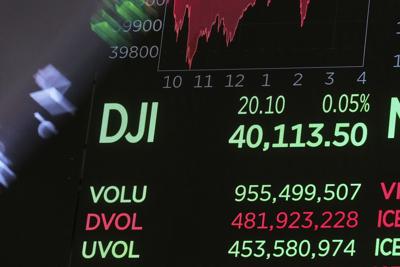NEW YORK — Big Tech stocks carried Wall Street on April 25 to the close of a winning, roller-coaster week, one that saw markets swing from fear to relief and back to caution because of President Donald Trump's trade war. The S&P 500 rose 0.7 percent Friday to pad its three-day rally to get it back within 10.
1 percent of its record set earlier this year. Spurts for Nvidia and other influential technology stocks sent the Nasdaq composite up a market-leading 1.3 percent.

But the big gains masked a mixed day of trading on Wall Street, where more stocks fell within the S&P 500 than rose and the Dow Jones Industrial Average added a modest 0.1 percent. Alphabet climbed 1.
7 percent in its first trading after Google's parent reported late Thursday that its profit soared 50 percent last quarter from a year earlier, more than expected. Alphabet is one of the biggest companies on Wall Street in terms of size, and that gives its stock's movements extra influence on major indexes. Another market heavyweight, Nvidia, was also a force pushing the S&P 500 upward after the maker of chips that are key to the artificial-intelligence craze rose 4.
3 percent. They helped offset a 6.7 percent% drop for Intel, which fell even though its latest quarterly results topped expectations.
The chip company said it's seeing "elevated uncertainty across the industry" and provided a disappointing financial forecast. It wasn't just Intel. Roughly three out of every five stocks in the S&P 500 sank.
They included Eastman Chemical, which dropped 6.2 percent after it gave a lukewarm profit outlook. CEO Mark Costa said that the "macroeconomic uncertainty that defined the last several years has only increased" and that future demand for its products "is unclear given the magnitude and scope of tariffs.
" Skechers U.S.A.
, the shoe and apparel company, pulled its financial forecasts for the year due to "macroeconomic uncertainty stemming from global trade policies" even though it just reported a record quarter of revenue at $2.41 billion. Its stock fell 5.
3 percent. Companies across industries have increasingly been saying the uncertainty created by Trump's tariffs is making it difficult to give guidance for the upcoming year. Stocks bounced back from a steep slide Monday on hopes that Trump may be softening his approach on trade and his criticism of the Federal Reserve, which had earlier shaken markets.
The hope is that if Trump rolls back some of his stiff tariffs, he could avert a recession that many investors see as otherwise likely because of his trade war. But Trump's on-again-off-again tariffs may nevertheless be pushing households and businesses to alter their spending and freeze plans for long-term investment because of how quickly conditions can change, sometimes seemingly by the hour. "Business owners scrambling to figure out their supply chains and exposure to tariffs is more than just a distraction," according to Brian Jacobsen, chief economist at Annex Wealth Management.
"It could be an existential threat, especially for smaller businesses that don't have the scale or resources to have the same supply chain flexibility as larger firms." In the bond market, Treasury yields eased, extending a decline after they climbed to nearly 4.50% this month.
They've been slipping as several reports on the U.S. economy have come in weaker than expected, bolstering expectations that the Federal Reserve may cut interest rates later this year to support growth.
A new report on Friday said sentiment among U.S. consumers sank in April, though not by as much as economists expected.
The survey from the University of Michigan said its measure of expectations for coming conditions has dropped 32 percemt since January for the steepest three-month percentage decline seen since the 1990 recession. The value of the U.S.
dollar meanwhile held steady against the euro and other rival currencies. It's been recovering some of its sharp, unexpected losses from earlier this month that had rattled investors..
Technology

Wall Street ends a topsy-turvy week on the winning side

NEW YORK — Big Tech stocks carried Wall Street on April 25 to the close of a winning, roller-coaster week, one that saw markets swing from fear to relief and back to caution because of President Donald Trump's trade war.















